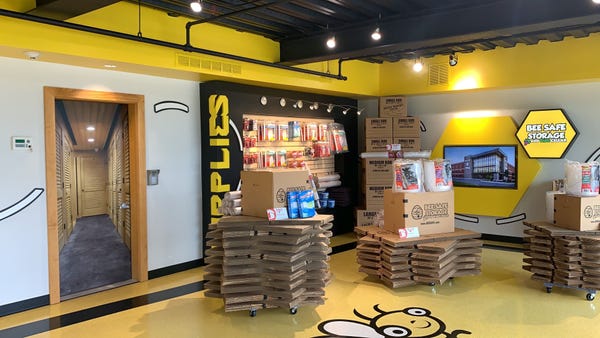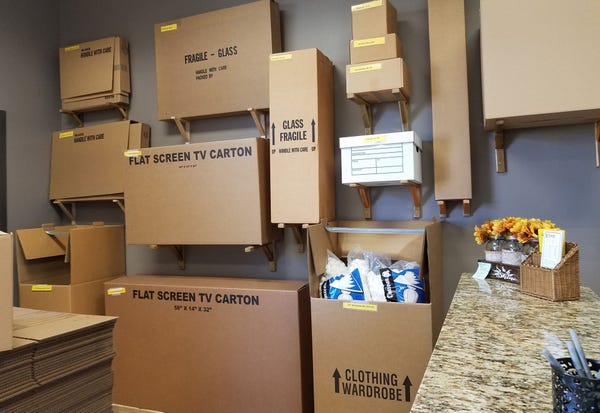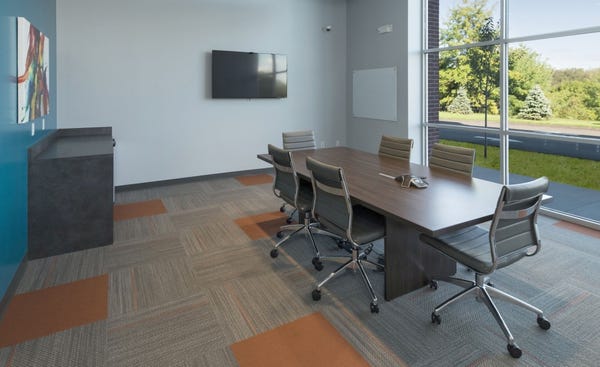More Customers, New Revenue: Add-On Profit Centers for Self-Storage
Self-storage profit centers can bring in additional revenue from tenants and entice customers who might not have otherwise considered doing business with your facility. Here’s an overview of add-on options and advice from fellow operators who’ve found success.

Self-storage operators spend a great deal of time and money trying to attract new customers. From alluring curb appeal to online marketing, these measures aim to fill units and generate revenue. However, there’s another way to boost your numbers. Add-on profit centers can have an immensely positive impact on your business. Offerings such as moving and packing supplies, truck rentals, tenant insurance, wine storage, mailbox rentals and others provide customer convenience and help you establish a connection with prospects.
“These products bring more foot traffic into the facilities and allow us to offer more than just standard storage units. A lot of the time, the profit centers will help lead to additional rentals at our storage facility,” says Alex Erbs, president of Erbs Management Group, which provides consulting services and manages eight properties in four states.
Offering more than traditional storage can give your business a market advantage. Customers want simplicity and ease. When you provide more options, they’re more likely to choose your facility over a competitor. Once you’ve lured them through your door, you’ll have more sales opportunities.
“Many times, people will see our signs for boxes and moving supplies, come in to buy, and realize what a nice facility we have. They'll also remember our customer service when they need storage,” says Anna Ross, manager for Tower Self Storage in Monroe, La. “The other side is that when someone comes in to rent a storage unit, they see all the supplies we offer and that they can get them in one spot.”
Whether you’re considering the addition of a simple retail store or building a new self-storage site that’ll incorporate several ancillary offerings, you must know how to properly choose, implement, manage and market your chosen profit centers. Following is an overview of options, plus advice from fellow facility operators who’ve found success.

The colorful retail store at Bee Safe Storage and Wine Cellar in Greer, S.C.
A Retail Store
One of the easiest profit centers to set up and manage is a retail store. A majority of your customers are on the move, so they’ll need supplies to safeguard their belongings. Boxes and locks should be regular staples, but think about other products you might offer, such as protectors for mattresses and other furniture, packing peanuts and paper, dish- and glass-protection kits, and even Sharpies for clear marking.
When it comes to displaying your products, consider how customers will engage with them. Put like items together and keep the store orderly but full. Clearly mark products with prices, as some people won’t be willing to ask. This can be done through stickers or signage.
You can also create eye-catching displays with pegboards or artfully stacked boxes along the fringe of your office. Demonstrate how some items work by adding clothes to a wardrobe box or a glass and plate to dish kit. When customers get a visual, they’ll be more inclined to make a purchase.
“We have a box display with a color-printed and laminated page advertising the size, rate and packing ideas,” says Ryan A. Evans, operations manager for Secure Storage, which operates three California facilities. “We always make sure the retail is well-stocked and labeled. It’s what the customer expects, and it makes the small guys look professional and prepared for the customer’s needs.”
A large retail store is one way Tower Self Storage sets itself apart from its competitors. “We try different types of boxes and search for new products to try for sales,” Ross says. “Some of the best sellers are suggestions from customers! I also sell a moving-box bundle, which saves customers money vs. per-box price but amounts to a larger ring-up for us.”
While a big management office is ideal, even a smaller one can host a money-making store. Consider displaying a sample item of each product, then stocking surplus in a back room or even an adjacent storage unit.

An example of box labeling at Tower Self Storage in Monroe La.
Truck, Van and Trailer Rentals
A large portion of your tenants will need transport when moving belongings into their storage unit. While offering the rental of trucks, cargo vans and trailers can be profitable, you need the space and the manpower to make it work. However, the benefits for customers can’t be denied. “A moving truck is convenient because they can rent it when they are ready and drop their items and truck all at one location,” Evans says.
Vehicle rentals might even allow you to poach from your competition. “This also allows us to grab additional storage customers who may have made a reservation at another location, and allow us to price-match or beat what they were going to pay, making us the one-stop for the customer,” according to Evans.
Mailbox Rentals and Package Acceptance
Mailbox rentals are popular with business customers and college students. Secure Storage offers them at select locations. “We have priced the mailboxes lower than the post office so customers select us over a traditional P.O. box. It’s also much more cost-efficient than a mailbox store,” says Evans.
Another service that goes hand-in-hand with mailbox rentals is package acceptance. “By allowing packages to be delivered, we give the customer that extra nudge to select us,” Evans adds. After the fifth day of holding a package for a customer, Secure Storage charges a nominal fee, which brings in additional revenue.
Business Services
An increasingly growing segment of the self-storage customer base is business operators, particularly during the coronavirus pandemic when lots of people are working from home. You can offer many services that cater to telecommuters, established commercial tenants, local business owners, entrepreneurs, students and other community organizations. The options include workstations, WiFi, conference rooms, fax and printer use, and more.
Star Self Storage & Office Suites in Sharonville, Ohio, has found success by catering to its business clientele. The facility has a small office center with a conference room and kitchenette, plus offices suites that come furnished or unfurnished. All utilities are included in the rental. These spaces can be leased alongside a storage unit or bundled as a special package for business owners for even bigger profit. “We also offer a workspace in the main office where customers can sit down and do some paperwork, which is perfect for our road warriors,” says Bill Wharton, general manager.

The conference room at Beyond Self Storage in Robinson, Pa.
Tenant Insurance and Protection Plans
This profit center is simple to initiate, takes up zero space and won’t be a time-suck for staff. Plus, by offering (or requiring) a tenant insurance or protection plan, you’re helping customers safeguard their belongings.
“The benefit of offering insurance is just security for our tenants and coverage if they need it,” Ross says. Tower Self Storage began requiring proof of insurance for all new tenants a few years ago. “You'd be surprised by how many people believe that our insurance would cover their belongings,” she adds. “I’ve had people not rent because they didn't want to pay for insurance. But since our area had two major hurricanes within a month of each other, it’s a lot easier to sell it.”
If a tenant has homeowners’ or renters’ insurance, the facility will accept a copy of a declarations page as proof. If not, the customer must purchase the facility’s offering. “Since this is now a requirement of our lease, our insurance sales have doubled,” Ross says.
Art and Music Space
A newer self-storage concept gaining ground is space for artists and musicians. 1784 Capital Holdings LLC has allocated units at its Steam Pump Self Storage location in Oro Valley, Ariz., for artists and producers of creative goods.
Another operator that caters to artists is Bridge Storage and ArtSpace in Richmond, Calif. The company redeveloped 5,000 square feet of its storage units into 28 studio spaces. Bridge also added an active gallery that displays the work of artists, musicians, carpenters and others.
STORExpress, which operates one facility in Ohio and nine in Pennsylvania, features both art and music space at several of its properties. The studios range from 100 to 950 square feet and are equipped with amenities such as WiFi, heat and electricity. Four sites offer rooms specifically for music practice with sound-resistant walls and 20-amp power.
Moving Services
Since self-storage and moving go hand-and-hand, teaming up with a local moving company could be a profitable endeavor. Beyond Self Storage, which operates 23 facilities in 10 states, recently partnered with Bellhop to offer moving services to its clientele. The “No-Sweat Storage Solution” program connects storage customers with moving companies and truck rentals. The partnership was born from Beyond’s desire to provide a top-quality customer experience.
Choosing What to Offer
Selecting the add-on products and services to offer at your self-storage facility can be tough, as there are many aspects to contemplate. You must consider the following.
What your market needs. The first step is to determine whether your market is right for a particular add-on. For example, a facility near a recreation area would be ideal for vehicle storage, while a property in a downtown area might not. A facility near a college or university could benefit greatly with a truck-rental program, mailbox rentals or even a pack-and-ship center.
Wine storage, in particular, is a niche that requires the right market. Carl’s White Glove Personal Storage & Wine Vault, which just opened in November, found a sweet spot for this service in Naples, Fla. The three-story facility offers traditional storage units as well as a 4,000-square-foot wine vault.
“There’s a huge demand for high-quality wine-storage solutions in Naples from clients who’ve outgrown their own storage or want a reliable provider they can trust,” says Bruce Nichols, owner of The Wine Store Naples, who provided consultation for the development. “Current weather problems in Florida drove demand for this service to safeguard high-value collections.”
The amount of space required. You must consider how much room you’ll need to accommodate your profit center. To offer vehicle storage, for example, you’ll need a substantial amount of vacant land or building space; but wine storage, on the other hand, can be built on a much smaller scale. A cell tower needs adequate ground cover, but a records-storage center could be limited to a single building or floor. Tenant insurance requires no space at all!
The impact on staff. Even if your market has demand for a specific product or service and you have ample space, you still must make sure your staff can cover it. Erbs Management chooses its profit centers according to how its facilities are structured and staffed. Sites manned by multiple employees are better equipped to handle more volume. One that’s managed by only one or two employees might not be ideal for a large truck-rental service, but retail, wine and business services are likely still manageable.
Ultimately Making the Sale
Of course, just offering a profit center doesn’t guarantee sales. You need to market your offering to existing customers and the community at large. This can be accomplished in a variety of ways, from signage to email campaigns to your website to verbal communication.
“We put references to our tenant insurance and outdoor parking into all of our monthly invoices that are sent out, so customers are aware of the products we offer,” Erbs says. “We also try to have additional signage on site, so when existing customers are coming to their unit, they’re aware we have retail items and truck rentals.”
Secure Storage takes a similar approach to promote its truck-rental business. “We advertise on all phone calls, have photos on the website, and make sure that when we get a truck, it gets a quick cleaning, proper window signage is put up, and we park it in a pleasing way,” Evans says. “Also provided is a self-service option, so any truck can be picked up at any time on the customer’s schedule.”
Once your customers know about these extras, it’s time to close the sale. For Erbs, the “perfect rental” involves renting a unit, selling the customer some retail items and insurance, and renting him a truck for the move. “This would be a maximization of all the profit centers that are in the facility,” he says. To encourage managers to achieve this, the company hosts friendly contests to see who can get the highest percentage of profit-center sales.
While revenue from ancillaries can vary greatly, every operator should aim to provide more than just self-storage units. Consider what your market needs, and how much space and employee time you can devote to these products and services.
“Profit centers are great add-ons to your facility and can bring you extra profit, which, in turn, leads to a higher market value for your property,” Erbs says “Be sure the profit centers are only helping you, not bringing you more headaches or wasting your time.”
About the Author(s)
You May Also Like





